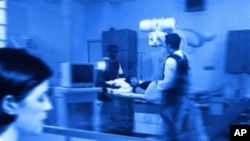Release of radiation from Japan's crippled Fukushima Daiichi nuclear plant has raised fears about an increased risk of cancer. Radiation can cause cancer, but it's also used to treat many forms of the disease. Now, a new study finds radiation treatment could be blamed for about eight percent of second cancers.
In this new study, researchers looked at medical records of about 650,000 cancer patients treated over a 30-year period starting in 1978. They wanted to see how many patients developed a second cancer after their initial treatment, that might have been triggered by the radiation therapy.
Lead author Amy Berrington de González of the U.S. National Cancer Institute says that radiation treatment could be blamed for about one out of 12 second cancers. "And this suggests that most second cancers are actually caused by other factors - so probably lifestyle factors or possibly even genetics as well."
Those factors are also some of the possible causes of the original cancer.
A one-in-twelve chance of such a serious side effect might leave doctors and patients wondering about the value of radiation therapy, which after all is supposed to make you better. But Berrington says fewer than 10 percent of patients in the study developed a second cancer, so the odds against any individual patient are really very small.
"By about 15 years after treatment, there were five cancers that could be related to radiation for every 1,000 patients treated," she said in a telephone interview. "And this so-called 'absolute risk' is the sort of figure that can be particularly useful for physicians, we think, to help them put the risks of treatment into perspective with the benefit."
Patients with certain cancers - including cervical and testicular cancers - had much higher rates of radiation-induced second cancer. Cancers of the eye and mouth had lower rates. Berrington says that's likely related to how narrow or wide the radiation beam is during treatment.
Also, age may be a factor. Berrington suggests that younger patients may be at higher risk since their cells may be more sensitive to radiation.
Amy Berrington de González's study on second cancers following radiation treatment is published online by the journal The Lancet Oncology.
Radiation Treatments Rarely Trigger New Cancer
- By Art Chimes

Study finds 1-in-12 chance of developing disease a second time



